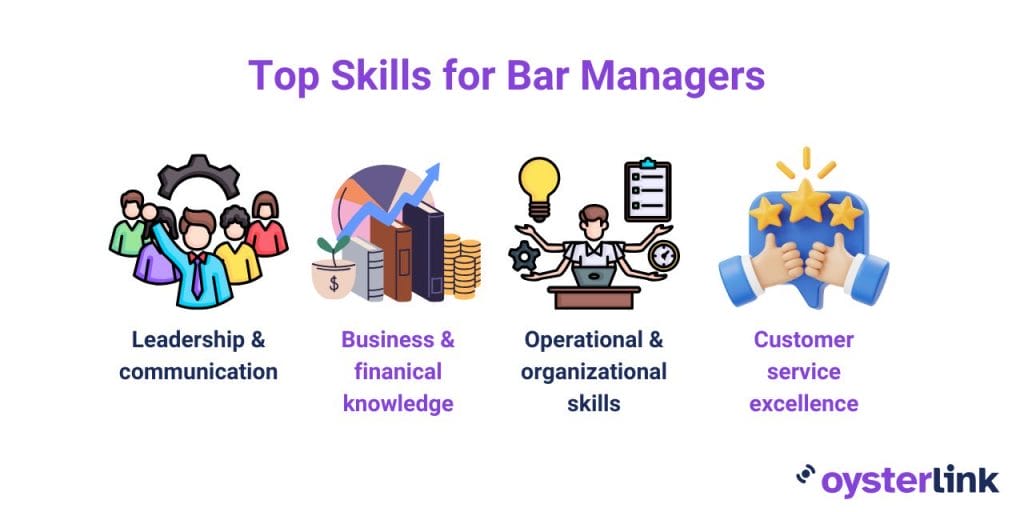For many Bartenders, the idea of becoming a Bar Manager represents the next big step in their hospitality career. It’s a chance to take on more responsibility, influence the bar’s success and, of course, earn a higher paycheck.
If you’re looking to move up the ranks, this guide will walk you through what it takes to become a Bar Manager, the skills you need and how to successfully make the leap from behind the bar to a leadership role.
Understanding the Bar Manager Role
Before stepping into a management role, it’s important to understand what Bar Managers do daily. While bartending is primarily about crafting great drinks and delivering top-tier customer service, managing a bar is about overseeing the bigger picture.
Bar Managers wear many hats, and their role typically includes:
- Supervising staff: Hiring, training and leading a team of Bartenders and Servers.
- Handling inventory and ordering: Ensuring the bar is stocked while managing costs efficiently.
- Managing bar finances: Tracking sales, setting drink prices and controlling expenses.
- Ensuring compliance: Enforcing liquor laws, health regulations and company policies.
- Creating a great atmosphere: Maintaining excellent customer service and handling complaints when they arise.
Skills You Need To Become a Bar Manager
Not everyone is cut out for management, and being a great Bartender doesn’t automatically make you a strong leader.
If you’re serious about stepping up, here are the key skills you’ll need to develop:
1. Leadership and communication
Managing a team means keeping everyone motivated and working together. You’ll need to:
- Provide clear instructions and expectations.
- Handle conflicts and difficult conversations professionally.
- Keep morale high, especially during stressful shifts.
2. Business and financial knowledge
Being a Bar Manager isn’t just about running a smooth shift — it’s about making smart business decisions that keep the bar profitable and efficient.
A successful Bar Manager understands:
- Pricing strategies – Setting drink prices to maximize profit.
- Cost control – Managing inventory efficiently to reduce waste.
- Sales tracking – Analyzing daily revenue and identifying trends.
3. Operational and organizational skills
A well-run bar relies on organization. As a Bar Manager, you’ll be responsible for:
- Scheduling staff efficiently to balance labor costs and service quality.
- Ensuring compliance with liquor laws and health regulations.
- Keeping things running smoothly, even during the busiest nights.
4. Customer service excellence
Your approach to customer service sets the tone for the entire team. A great Bar Manager:
- Handles complaints quickly and professionally.
- Creates a welcoming, enjoyable atmosphere for guests.
- Ensures high service standards are maintained at all times.

Gaining Experience as a Bartender
Becoming a Bar Manager doesn’t happen overnight. The best way to prepare for the role is by gaining hands-on experience beyond your regular bartending duties.
Master your current role
Before stepping up, make sure you’ve truly mastered bartending. That means:
- Perfecting your speed, accuracy and cocktail-making skills.
- Delivering exceptional customer service every shift.
- Understanding menu items, pairings and upselling techniques.
A Bar Manager needs to lead by example, so excelling in your current position is key.
Take on more responsibility
If you’re serious about moving up, start acting like a leader now. Some ways to do this include:
- Helping with inventory – Offer to track stock levels or place orders.
- Assisting with scheduling – Learn how shifts are planned and offer input.
- Training new staff – Share your knowledge and mentor junior team members.
Taking the initiative in these areas will help you build the skills necessary to manage a bar effectively.
Develop a leadership mindset
Transitioning from Bartender to Bar Manager means shifting your focus from just doing your job well to making sure the entire team performs at their best. That means:
- Supporting and motivating your coworkers.
- Handling conflicts professionally and finding solutions.
- Thinking beyond your shift and considering the bar’s long-term success.
If you start leading now, stepping into the role officially will feel like a natural progression.
How To Transition from Bartender to Bar Manager

If you’ve developed the right experience and skills, it’s time to start moving toward becoming a Bar Manager. Transitioning from Bartender to Bar Manager requires showing your commitment and expressing your career goals.
Express your career goals
Don’t assume your employer knows you want to move up — let them know you’re interested in a management role. Ask your current Bar Manager for mentorship and be vocal about your ambitions.
Seek formal training and certifications
While experience is the most valuable asset, some formal training can give you an edge. Consider enrolling in bar management courses or hospitality leadership programs to build your skills and knowledge.
Certifications like ServSafe or TIPS for responsible alcohol service are also beneficial, helping you stay compliant with regulations and ensuring the safety of your patrons.
Look for promotion opportunities
Many bars prefer to promote from within. If there’s an opening, make sure you’re the obvious choice by consistently taking on extra responsibilities. If your current workplace doesn’t have opportunities, start looking for Bar Manager roles elsewhere.
Ace the interview
If you land an interview for a Bar Manager position, prepare to discuss:
- How you’ve demonstrated leadership in past roles.
- Your understanding of bar operations and finances.
- How you would handle common challenges, such as staff conflicts or slow nights.
Confidence and preparation will set you apart from other candidates.
Thriving as a Bar Manager
Once you land the job, the real challenge begins. To thrive as a Bar Manager, focus on these key areas:
- Build a strong team: Hire and train staff who align with the bar’s culture, motivate employees and reduce turnover by fostering a positive work environment. Set the standard for service and work ethic by leading by example.
- Manage stress and stay organized: Stay organized to maintain control, prioritize tasks and delegate effectively. Stay calm under pressure, make quick decisions and maintain a work-life balance to avoid burnout.
- Continue growing in the industry: Keep learning by staying updated on trends and cocktail innovations. Network with professionals for insights and opportunities and invest in your growth by attending relevant courses and events.
By focusing on these areas, you’ll not only be a competent Bar Manager but a leader who excels in the role.
Final Thoughts on Becoming a Bar Manager
Becoming a Bar Manager is a rewarding career move for Bartenders who want to take on leadership, responsibility and higher earnings. By developing your skills, gaining management experience and taking initiative, you can successfully transition into this role and thrive in it.
If you’re ready to take the next step in your career, OysterLink can help. Whether you’re looking for Bar Manager job openings or career advice, OysterLink offers a wealth of resources to support your journey.
With job listings, industry insights and networking opportunities, we’re here to help you advance in the hospitality field and land the role you’ve been working toward.
Becoming a Bar Manager: FAQ
To become a Bar Manager, you generally need 2–3 years of bartending experience and a strong understanding of bar operations.
A high school diploma is typically required, and additional certifications, such as alcohol service permits, can be helpful. A degree in hospitality or business management is a plus.
Becoming a Bar Manager usually takes 2–5 years, depending on your experience and the opportunities available. With the right skills and proactive efforts, you may be able to move into the role more quickly.
Motivating and retaining staff often comes down to creating a positive and supportive work environment. Recognizing and rewarding good performance can help boost morale, and offering opportunities for growth can make employees feel valued.
Competitive pay and benefits, along with flexible schedules, are also key factors in retaining staff.
When dealing with difficult customers, it’s important to remain calm and professional. Listen carefully to their concerns and try to address the issue in a way that resolves the situation. It’s always a good idea to maintain a balance between ensuring customer satisfaction and sticking to bar policies.
New Bar Managers sometimes make the mistake of micromanaging or not delegating tasks effectively. It’s important to trust your team and give them the autonomy to succeed.
Other mistakes include not addressing staff issues promptly or failing to maintain a healthy work-life balance. Successful Bar Managers lead by example and keep their team motivated and organized.

Written by Sasha Vidakovic
Sasha is an experienced writer and editor with over eight years in the industry. Holding a master’s degree in English and Russian, she brings both linguistic expertise and creativity to her role at OysterLink. When she’s not working, she enjoys exploring new destinations, with travel being a key part of both her personal and professional growth.

Reviewed by Marcy Miniano
Marcy is an editor and writer with a background in public relations and brand marketing. Throughout her nearly decade-long career, she has honed her skills in crafting content and helping build brands across various industries — including restaurant and hospitality, travel, tech, fashion and entertainment.




